
Jaque Catelain
Nacimiento : 1897-02-09, Saint-Germain-en-Laye, Yvelines, France
Muerte : 1965-03-05
Historia
Jaque Catelain was a French actor who came to prominence in silent films of the 1920s, and who continued acting in films and on stage until the 1950s. He also wrote and directed two silent films himself and was a capable artist and musician. He had a close association with the director Marcel L'Herbier.
He was born as Jacques Guérin-Castelain in Saint-Germain-en-Laye. His father was then the mayor and also moved in literary and theatrical circles, which allowed the young Jacques to encounter many famous names in his childhood. He showed early enthusiasm for the arts and music, and at the age of 16 he entered the Académie Julian in Paris to study fine arts. With the outbreak of war in the following year, he changed direction and chose to study acting at the Conservatoire, enrolling in the class of Paul Mounet, before being mobilised into the artillery.
In 1914 Catelain met Marcel L'Herbier, then a writer and critic, who became a major influence on his life and career, and with whom he formed a lifelong friendship. When L'Herbier began directing films in 1917, Catelain became his leading man of choice and starred in twelve of his silent films, starting with Le Torrent, and they made Catelain into a leading star who was in demand to appear in foreign films as well as in productions of other French directors. In 1925 he was offered a seven-year contract by MGM to work in America, but he turned this down.
Jaque Catelain's activities in this period extended beyond acting. When Marcel L'Herbier set up his own production company Cinégraphic in 1922, its first project became Le Marchand de plaisirs which Catelain directed as well as acting a double role in it. In the following year he wrote and directed La Galerie des monstres (1923/24). Both films were successful enough to cover their costs. He devised controversial make-up for some of the actors in L'Inhumaine, and his artistic skills were put to further use in two set designs for L'Argent. As a pianist he would sometimes step in to provide improvised accompaniment for previews of L'Herbier's films.
Catelain successfully made the transition from silent to sound films, starring in L'Herbier's L'Enfant de l'amour (1929), but during the 1930s he took fewer leading film roles and started to act in the theatre. In February 1933 he married Suzanne Vial, a friend since childhood who had become a production assistant to L'Herbier in the 1920s and continued working with him until 1944. Soon afterwards in 1933/1934 he was employed by the daily newspaper Le Journal to go to Hollywood to carry out a series of interviews with leading personalities such as Chaplin, Stroheim and Sternberg.
In May 1940, Catelain left France for a four-month theatrical tour of South America, but within a month France was occupied by the Germans and his absence lasted for six years. In Buenos Aires he became so ill with pneumonia that he was given the last rites, but he recovered and went to Canada for the next three years for work in the theatre and propaganda broadcasts. In 1943 he was invited to Hollywood and remained there for a further three years. He returned to Paris in 1946, and resumed an occasional career in films, appearing in minor roles in three of Jean Renoir's films in the 1950s. In 1950, he published a biography and appreciation of the work of Marcel L'Herbier.
Catelain died in Paris in 1965.
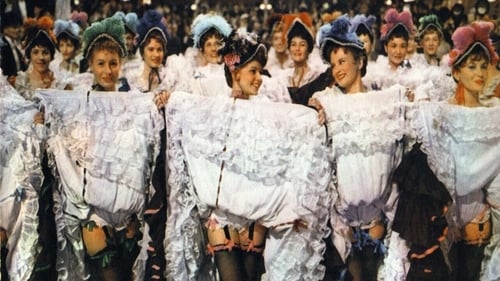
Le ministre (uncredited)
Tanto Nini, una guapa chica que trabaja en una lavandería, como otras atractivas jóvenes son contratadas por Monsieur Danglard para unirse a su compañía de teatro. Danglar tiene previsto abrir un nuevo cabaret en París, el Moulin Rouge, donde la gran atracción será el cancán. A pesar de que tiene novio, Nini es seducida por Danglard, pero su principal admirador es el príncipe Alexandre. Tras 15 años de estancia en los Estados Unidos, "French Cancan" supone el regreso de Renoir a su país.

Claudius
In Pompeii in the year 79, Lycias and Helen fall in love. Helen's guardian, the high priest of Isis, wants to separate them. To do so, he tries to make Lycias drink a love potion, but a young slave threatens to reveal everything. The high priest, unable to silence her, kills her and arranges to have Lycias accused...

Mr. Zoïca
The accountant of an insurance company, rather eccentric and quick to push the song, is responsible for monitoring the actions of an alluring South American whose suicide would mean the collapse of the company. Finally, the accountant discovers an attempted insurance scam and marries the surly and charming interpreter who was the liaison between the South American and himself.

Christian Darbel
The ordeal of Françoise who, deceived by her husband, sees her dying child. After a few events in the backdrop of a festival, the husband returns, she pushes him away, driving him to suicide. Another man she thinks she loves is already married.

Le directeur de Radio Azur (uncredited)
Monsieur Jourdain is a dangerous madman : he wants to share his fortune! His relatives do what any sensible fellow on earth would do: they have him committed to a mental hospital. But Jourdain manages to escape and decides to make everybody happy except... his heirs!

Le prince consort
The film depicts events between the Fashoda crisis in 1898 and the 1904 signing of the Entente Cordiale creating an alliance between Britain and France and ending their historic rivalry. It was based on the book King Edward VII and His Times by André Maurois. It was made with an eye to its propaganda value, following the Munich Agreement of September 1938 and in anticipation of the outbreak of a Second World War which would test the bonds between Britain and France in a conflict with Nazi Germany.

Adrienne Lecouvreur is an acclaimed actress who falls in love with Polish prince Maurice de Saxe, only to be poisoned by a jealous rival while Maurice is away at war. The film was a co-production between the two countries, and was made at UFA's Berlin Studios. It was based on the 1849 play Adrienne Lecouvreur by Eugène Scribe and Ernest Legouvé about the life of the eighteenth century actress Adrienne Lecouvreur.

Edwige, a rich American divorcee, goes to Morocco to look up an amazing pilot she once knew. The young woman's secretary, also an aviator, won't fly a plane because he was in a terrible accident. As he is in love with Edwige, the secretary does everything in his power to thwart her romance with the other pilot. He finally supplants his rival and wins the heart of his boss.

The woman thief evades a young lady who is onto his game, but then tries his wiles elsewhere on a married woman by attempting to compromise and ruin the husband she is happy with.
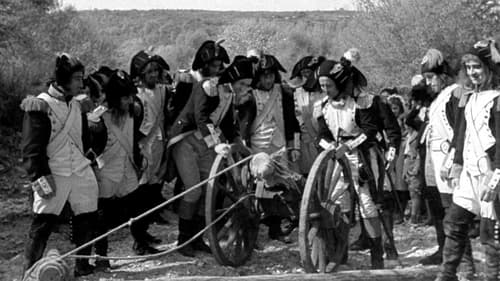
Capitaine Langlade
La Revolución Francesa vista a través de los ojos de sus participantes directos (desde los campesinos hasta el propio Luis XVI) es el tema de este drama de época dirigido por el maestro Jean Renoir.

The eponymous garçonne or flapper is Monique Lerbier, an emancipated French woman who leaves home to escape a marriage of convenience to a man she does not love which her parents have forced on her. She then falls into all sorts of carnal temptations and artificial pleasures previously unknown to her. These include her being seduced into a lesbian love affair by a chanteuse.

Dan
An indigenous uprising in British controlled Iraq threatens the route to India, as a lobe triangle develops among the expatriates.
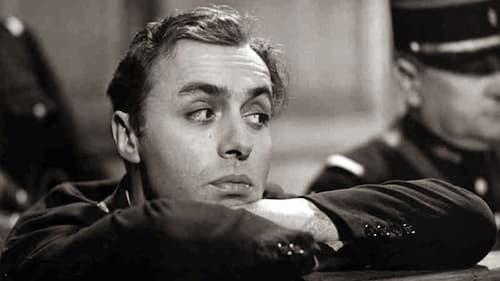
Geoffroy de Chabré
Philippe Lutcher, an anarchist, fires a shot at Clara Stuart, a famous stage and screen actress, but only wounds her. The star, through affectation and curiosity to know his motives, pleads in his favour at his trial, but he rebuffs her pity. After he has served 18 months in prison, they meet and fall in love.

Prince Mirano
A film actress falls for an extra on her set, he turns out to be a prince.

Two young lovers. An arranged marriage. An older groom. The lovers develop a plan to convince the groom that she is unworthy and also to discredit him. A surprise ending convinces the father that he should bless the lovers' marriage.

Félicien

Maurice Orland
The illegitimate son of a music-hall star and an ambitious politician has grown up to become a journalist. He decides to get back at his father by using blackmail.

Vassia

Arnaud de Saint-Guil
"L'Occident" presents a story of the reaction of East and West in contact. It is based on a novel of Henry Kistemaeckers, produced for the screen by M. Henri Fescourt. The story is of the love of Hassina, daughter of a Moroccan chief, and Lieutenant Cadière, who lands from his ship to get information for the fleet about the position of an army of rebel tribesmen.

Marquis
Clothilde, taken out of her convent to marry the Marquis, refuses to recognize her new husband.

Delphin Leherg - le fils de Leherg qu'aime Ludivine
Ludivine, a lttle tomboy, takes on the too polite Delphin. Being caught, and punished, she wants him and his father to be dead. When the latter dies, she feels guilty and takes Delphin under her wing.

Henri de Cassel - le sosie de Dimitrieff, abattu par Svirsky
The film opens with the overthrow of the Czar during the 1917 Russian revolution. The family of General Count Svirsky (Roger Karl) cower in their home, certain that the mobs of angry peasants will tear them apart. But even in this moment of crisis, Svirsky can find time to murder the young officer who has been having an affair with Countess Svirska (Emmy Lynn). The Countess knows what has happened, but she loyally remains with her husband as they escape to the safety of the French Riviera. It is here that the Countess meets Henri de Cassel (Jaque Catelain), the “living image” of her dead lover.

Octavian
The story: While her husband is becoming famous in the war, the marshal of Werdenberg's wife consoles herself in the arms of the youngster Octavian and tries to arrange the love affairs of her cousin, the baron Ochs, by presenting him to young Sophie. This baron is taken with her and the Marschallin proposes Octavian to be his "Rosenkavalier" in order to present the traditional silver rose to his fiancée. But youngsters are youngsters and sex hormones hold sway over the whole world so for that reason immediately Octavian and Sophie fall in love with each other…

Unkwown to the vast majority, Count Patrice is the crown prince of Simenia. One day he sails for the East on his yacht "Bengal" in the company of Christiane, a beautiful princess, in love with him. Chance has it that Patrice sets Anar, an Oriental beauty, free from the harem where she is held captive. Love is born between the two young people, which infuriates Christiane. Mad with jealousy, the vexed woman sets about preventing Patrice and Anar from marrying... by all means fair or foul!
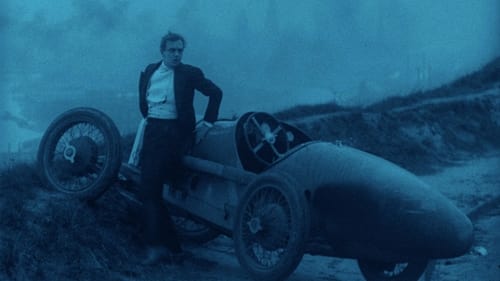
Einar Norsen
“La inhumana” cuenta la fascinación que ejerce una famosa prima donna, Claire Lescot, entre los hombres. Sin embargo, lo importante en esta película muda no es tanto la historia como la celebración de las diversas manifestaciones artísticas de mediados de los años 20. Para realizar este filme, el director contó con la contribución del artista Fernand Léger y el arquitecto Rob Mallet-Stevens.

Riquet's
La vida del payaso Riquet y su esposa, la bailarina Ralda, se ve amenazada por el propietario del circo donde trabajan, que desea a la joven y no dudará en intentar asesinarla cuando ésta lo rechaza.

Director
La vida del payaso Riquet y su esposa, la bailarina Ralda, se ve amenazada por el propietario del circo donde trabajan, que desea a la joven y no dudará en intentar asesinarla cuando ésta lo rechaza.

Gosta / Donald

Director
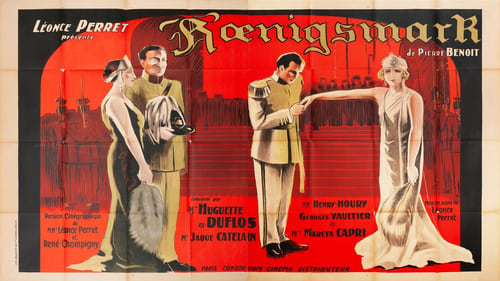
Professeur Raoul Vignerte
To fulfill her Father's wish, Grand Duchess Aurora (Huguette Duflos) is forced into an unhappy marriage with Grand Duke Rudolph (Henry Houry). He prepares to leave for the Congo but is murdered by his own brother (Georges Vaultier). Aurora goes to Paris with her father and, there, is told on the phone of her husband's death. After returning to the Kingdom, she meets a tutor (Jaque Catelain) who falls in love with her..

Don Juan de Manara
Crazy scientist Faust tries to take Don Juan's lover away.

Hedwick
In Granada in Spain, Sibilla works as a dancer in a squalid cabaret called El Dorado, struggling to earn enough to care for her sick child. The boy's father Estiria, a prominent citizen, refuses them both help and recognition, fearful of jeopardising the engagement of his adult daughter Iliana to a wealthy nobleman. Iliana however slips away from her engagement party to meet her real lover Hedwick, a Swedish painter. Sibilla, in desperation after a further rejection by Estiria, sees an opportunity to blackmail him by locking the lovers overnight in their meeting-place in the Alhambra.

Toudieu
A vamp seduces a banker and breaks with him when she's obtained all that she wanted.

Editor
Nolff, a tough Breton fisherman is happy: his wife has just given birth to a son, Michel. His only wish is to make him a fisherman like him. But when he becomes a man, Michel becomes a good-for-nothing who spends his time in taverns.

Michel
Nolff, a tough Breton fisherman is happy: his wife has just given birth to a son, Michel. His only wish is to make him a fisherman like him. But when he becomes a man, Michel becomes a good-for-nothing who spends his time in taverns.

Juan Tristan
Comtesse Della Gentia and her lover Paul attempt to seduce and blackmail a rich neighbour Juan, who is in love with a naïve young friend of theirs, Clarisse. Their plot fails; the Comtesse kills herself at a ball, and her lover re-covers her face with its mask.

Evelyne attempts to reconnect with her family after a traumatizing experience with a young writer.

Laurs
A poem to love & patriotism soon after the end of WWI. A highly original and poetic film using many experimental camera techniques, which proved too fanciful for many but which established his reputation as a talented innovator. This is the director's debut film and it is considered the second impressionist film, the first being Abel Gance's, 1918, La Dixième symphonie (The Tenth Symphony).

Production Design
A poem to love & patriotism soon after the end of WWI. A highly original and poetic film using many experimental camera techniques, which proved too fanciful for many but which established his reputation as a talented innovator. This is the director's debut film and it is considered the second impressionist film, the first being Abel Gance's, 1918, La Dixième symphonie (The Tenth Symphony).
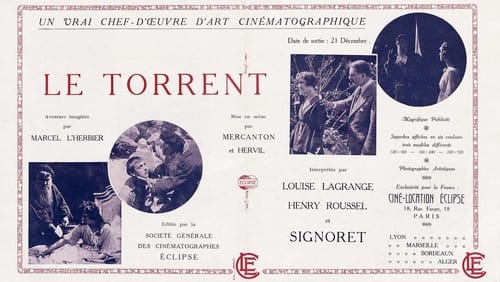
Inio
"A charming story of a young society girl and the pathetic love of a youth..." Considered a lost film.










